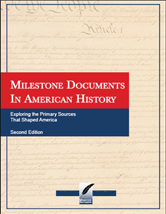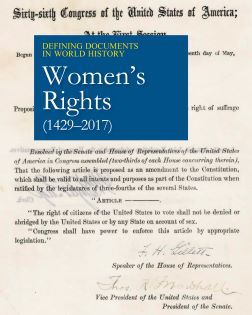Choosing a topic
Picking a topic is research! Topics start very broad and then need to be narrowed down to a manageable size. For this class you will write an historical analysis research paper, which is similar to an argumentative essay. The topic should be something you can analyze and prove an idea--do not summarize your topic. Your can choose any topic, idea, or event, that is related to US History after 1877 and before 2001.
Check out this brief tutorial from North Carolina State University
Research Topics
Developing a research question is a process. To help with the process, look through the table of contents of your textbook for ideas. Find a topic that you are interested in learning more about. After you choose a broad topic, narrow it down to a specific group of people, event, or concept. Below are some suggestions:
People
- Women
- African Americans
- Native Americans
- Mexican/Hispanic citizens
- Chinese Immigrants
- Athletes
- Farmers, miners, soldiers
- Presidents
Events
- Great Migration
- Triangle Shirtwaist Factory Fire
- World War, 1914 - 1919
- Scopes Monkey Trial
- Scottsboro Boys
- World War, 1941 - 1945
Economics, Politics, Culture
- The Middle class
- The Gilded Age
- The underground railroad
- Labor Movements
- Populists
- Progressivism
- NAACP
- Ku Klux Klan
- Suffrage / Anti-Suffrage
- Jazz Age / Harlem Renaissance
- Prohibition
- The California Gold Rush
- Urbanization
- Great Depression
- Dust Bowl
- New Deal
- The American Dream
- Civil Rights
Use the 5 Ws to narrow your topic:
- Who
- What
- When
- Where
- Why
The Five W criteria can add context to your investigation and turn a topic into a research question.
- WHO describes an individual or select population you are investigating.
- WHAT The problem -- describes a specific aspect or element that directly impacts the WHO.
- WHEN is a time frame in which you might limit your investigation
- WHERE is a geographical location where you might focus.
- WHY is the reason why this investigation is important or meaningful. The WHY is not necessarily a part of the final research question but more informative of the scope of the project in general.
Primary Sources
Primary sources provide first person experiences on your topic. Primary sources include letters, legal documents, interviews, live performances, images, and artifacts. Primary sources can be found in books, newspapers, and journals. They can also help you narrow your topic and discover keywords for further searching. Below are primary sources related to suggested topics:
-
 Milestone Documents in American History : Exploring the Primary Sources that Shaped America
by
Landmark reference source covering major themes in American history, with emphasis on African American history, women's history, immigration history, as well as 21st-century issues ranging from terrorism to campaign finance to LGBTQ right.
Milestone Documents in American History : Exploring the Primary Sources that Shaped America
by
Landmark reference source covering major themes in American history, with emphasis on African American history, women's history, immigration history, as well as 21st-century issues ranging from terrorism to campaign finance to LGBTQ right. -
Rockin' the free world! : how the rock & roll revolution changed America and the world by
Call Number: ML 3918 .R63 K39 2018Rockin' the Free World then shows how artists have engaged in advancing change via opportunity and education; domestic and international issue advocacy; and within the recording and broader communications industry. The book is built around primary interviews with prominent American and international performing artists ranging from Rock and Roll Hall of Fame inductees and Grammy winners to regional and local musicians. -
Thurgood Marshall: His Speeches, Writings, Arguments, Opinions, and Reminiscences by
Here are briefs he filed as a lawyer, oral arguments for the landmark school desegregation cases, investigative reports on race riots and racism in the Army, speeches and articles outlining the history of civil rights and criticizing the actions of more conservative jurists, Supreme Court opinions now widely cited in Constitutional law, a long and complete oral autobiography, and much more. -
The Words of César Chávez by
A collection of speeches and writings by the Mexican American labor activist and head of the United Farm Workers.Cesar Chavez's relentless campaign for social justice for farm workers and laborers in the United States marked a milestone in U.S. history. Through his powerful rhetoric and impassioned calls to action, Chavez transformed as well as persuaded and inspired his audiences. -
 Defining Documents in World History
Call Number: REF HQ 1236. W664 2018 vol. 1 & vol. 2This source is available online and in print formats.
Defining Documents in World History
Call Number: REF HQ 1236. W664 2018 vol. 1 & vol. 2This source is available online and in print formats.
Provide in-depth analysis of a broad range of historical documents from influential figures in women's history from the United States and around the world. See chapters about: Gloria Steinem, Shirely Chisholm, Ella Baker, Betty Friedan, and many more. -
 I have spoken: American history through the voices of the Indians
by
Call Number: E 98 .O7 A7 1971A chronological compilation of both famous and unfamiliar Indian speeches from the seventeenth to the twentieth centuries.
I have spoken: American history through the voices of the Indians
by
Call Number: E 98 .O7 A7 1971A chronological compilation of both famous and unfamiliar Indian speeches from the seventeenth to the twentieth centuries. -
 Defining Doucments of American History: LGBTQ+ (1923-2017)
by
Call Number: REF KF 4754.5 .L495 2018 v.1As gay, lesbian, and transgender individuals have continued their fight for basic rights and equal treatment under the law, various court cases and challenges to those cases have continued to refine the debate. This new resource provides important analyses of over 80 documents significant to LGBTQ rights
Defining Doucments of American History: LGBTQ+ (1923-2017)
by
Call Number: REF KF 4754.5 .L495 2018 v.1As gay, lesbian, and transgender individuals have continued their fight for basic rights and equal treatment under the law, various court cases and challenges to those cases have continued to refine the debate. This new resource provides important analyses of over 80 documents significant to LGBTQ rights -
The Road South by
Revisits the inspiring and heroic stories of the Freedom Riders, through their own words.